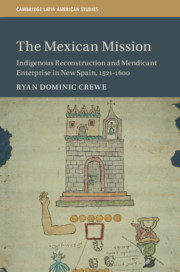Book contents
- The Mexican Mission
- Cambridge Latin American Studies
- The Mexican Mission
- Copyright page
- Dedication
- Contents
- Figures
- Maps
- Tables
- Acknowledgments
- Introduction
- Part I Conversion
- Part II Construction
- Part III A Fraying Fabric
- Appendices
- Glossary
- Sources and Bibliography
- Index
- Cambridge Latin American Studies
Introduction
Published online by Cambridge University Press: 13 June 2019
- The Mexican Mission
- Cambridge Latin American Studies
- The Mexican Mission
- Copyright page
- Dedication
- Contents
- Figures
- Maps
- Tables
- Acknowledgments
- Introduction
- Part I Conversion
- Part II Construction
- Part III A Fraying Fabric
- Appendices
- Glossary
- Sources and Bibliography
- Index
- Cambridge Latin American Studies
Summary
Across the highlands of central Mexico, hundreds of stone churches stand as a testament to the turbulent history of sixteenth-century Mexico. Austere and windowless, their massive walls of dark red stone propped by pyramidal buttresses, the largest of these missions are among the most imposing erected in the Spanish Empire. In bustling provincial towns and near-abandoned villages these edifices are still imposing, with gothic arches and barrel vaults often rising as high as eighty feet. Closer up these structures lose their severe appearance as their details come into view. In delicately-carved façades, and on murals inside the churches and their adjoining monasteries, native artists left lavish evidence of Mesoamerica’s encounter with the European Renaissance. Surrounding these structures, vast churchyards attest to the multitudes that once assembled for masses and instruction. The scale of these missions seems outsize for the handful of mendicant friars who used them as their bases. Yet between 1521 and 1590, indigenous communities undertook monumental campaigns in the wake of conquest and in spite of four catastrophic epidemics, each of which was on the magnitude of the Black Death. Stone by stone, laborers built the infrastructure for one of the most extensive mission enterprises in global history. Amid these stout cloisters and churches that still echo with murmured prayers, questions arise: What motivated native communities to raise these complexes while they sought to recover from conquest and epidemics? Are these walls a testament to Spanish power? Or are they monuments to indigenous persistence?
- Type
- Chapter
- Information
- The Mexican MissionIndigenous Reconstruction and Mendicant Enterprise in New Spain, 1521–1600, pp. 1 - 20Publisher: Cambridge University PressPrint publication year: 2019

